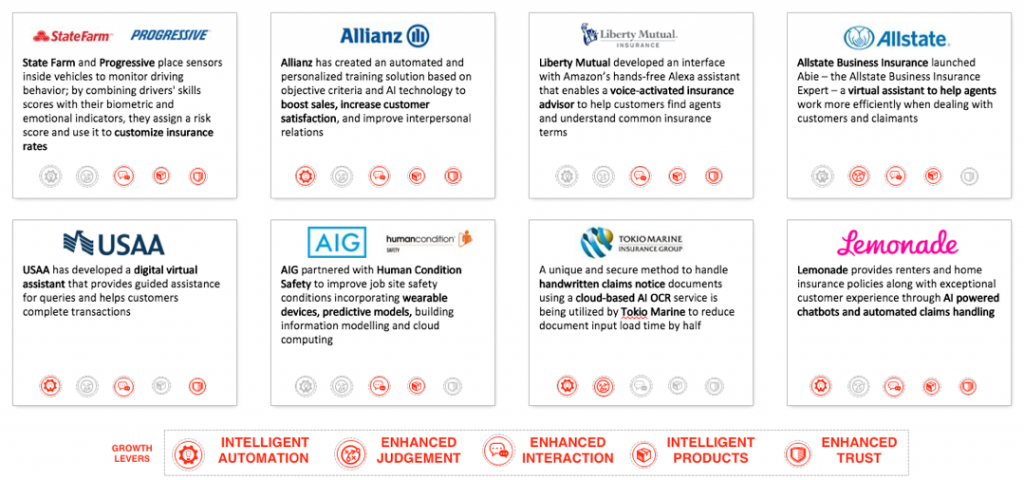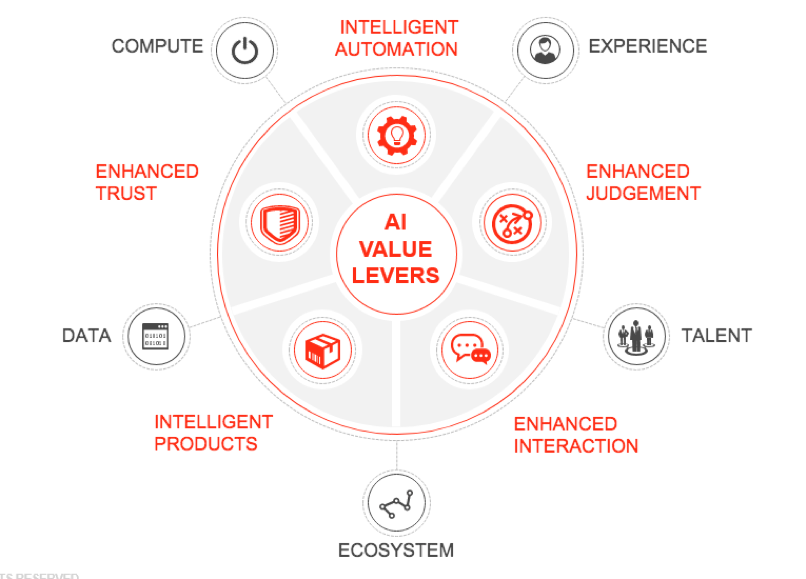Other parts of this series:
The key ingredients for a strategy to amplify your company’s value on your AI journey.
On our AI journey so far, we’ve looked at what artificial intelligence is today , as well as how to gauge an insurance company’s AI readiness (did you take the quiz?). Armed with that knowledge as a baseline, it’s now time to put together an AI strategy—your secret sauce—that can boost your enterprise’s value.
The base ingredients of the AI secret sauce
I’m here to share some insight on how to boost your company’s value by using AI. However, it’s important to note that there is no single path ahead. Each company has a unique foundation—your services and capabilities—that some AI technologies can augment and amplify now, while other technologies may be less helpful for generating sustainable growth and economic value.
Other key ingredients of a sustainable AI strategy are:
- Value levers
- Value enablers
- AI lessons learned
Value levers for a sustainable AI strategy
On top of your unique foundation, value levers enable you to deliver significant benefits through AI. The following levers can be applied: intelligent automation, enhanced judgment, enhanced interaction, intelligent products and enhanced trust.
Here are some examples of leading insurers applying these levers in their use of intelligent technology:
By using these levers, insurers can use AI as a catalyst to drive growth, profitability and sustainability. Sompo Japan Nipponkoa Insurance looks to leverage AI in order to achieve all three aspects—it announced earlier this year that it will use artificial intelligence to examine car insurance claims, as well as GPS and dash cam recorder data to enable quicker payouts of benefits.
Five enablers of effective AI strategy
Your company has unique services and capabilities that are augmented by value levers. With those in place, value enablers can bring your AI strategy to the next level. Companies must enable their organizations and people to be appropriately equipped and skilled to fully leverage the benefits of AI.
The five enablers of an AI strategy are:
Compute
The more complex and useful AI techniques require advanced compute processing power to train, run, and act—which can be run at lower costs.
Data
AI also requires data to train, learn and act. The more information is readily available, accessible, and accurate, the more successful AI is likely to be. Dark data that is typically unstructured and unanalyzed—and mostly neglected—is just one example of potentially valuable information that can enhance the impact of AI.
Ecosystem
Investments in digital capabilities, including the Internet of Things and platforms, expands the amount and type of information available to AI solutions. As an example, Intesa Sanpaolo recently bought the majority of a €5 million stake in Italian insurtech startup Yolo. This was a strategic investment to support innovation within the group’s non-life insurance business and its instant banking company.
The experience
AI enables technology designed specifically for individual human behavior and interactions. A richer understanding of customers’ goals and preferences—and how these change in the course of their lives—will not only allow the insurer to enhance the customer experience, but also the effectiveness of the products and services it provides.
Talent
Companies need to have the talent to design, craft and manage the AI solutions they develop. In addition, they must empower employees to learn how to best leverage the augmentation capabilities that AI offers.
Insurers that embrace both value levers and enablers will drive value across the value chain, accelerating and enhancing the benefits of AI. 
Key lessons for insurers
While it may be tempting to aim for perfection, it can be more advantageous to start with a pilot or prototype in one area of your business. Insurers can learn from these key lessons:
- Forge alignment across IT, data science and the business.
- Build, hire and maintain AI and data science talent.
- Cultivate architecture and processes to support AI development and production.
- Create a plan to proactively address responsible AI—a topic that will be addressed at the end of this series.
Are you ready to create your secret sauce?
In my next post, we will look at AI as the catalyst to reimagine the insurance workforce. For more insight into AI for insurance, download the Accenture Technology Vision 2019 for Insurance, or get in touch with me here.










